Have you ever thought about how problematic an extension cord can be? Misjudging or incorrectly selecting a cord can lead to a myriad of problems, whether they be operational, hazardous, or damage to your equipment, tools and work area.
This is the primary reason why knowing the relation between length, thickness, and the power that can be fed safely is necessary for trouble-free operation.
With the right extension cord, you not only facilitate the proper functioning of your appliances but also avert a multitude of electrical dangers.
Every detail, from the environment where you’ll use it to the safety certifications it carries, matters in making the best choice.
Read until the end to select the perfect extension cord for every use.
1. Determine the Cord Length You Need
First things: before deciding which extension cord to buy, it is important to determine the distance from your power source to the device or tool you will use. This consideration is crucial because if the distance is underestimated, the cord will not reach, and the user must take drastic safety measures by pulling or connecting multiple cords.
In addition, when the cord is excessively longer than needed, there is a risk of experiencing a voltage drop, which is bad for the productivity of the tools and appliances serviced.
Also, easily tripping over longer cords makes the workspace more cluttered. So, once your requirements are clearly defined, get ready to buy a better matching cord.
The extension cords are manufactured in different sizes; their lengths vary from a couple of feet to over a hundred, meaning there is the right-sized cord for any task without compromising safety. Therefore, ensuring the correct extension cord length maintains workplace order and safety.
2. Check the Gauge (Thickness) of the Cord
The extension cord’s gauge number reveals how thick the corresponding wire is, determining how much electrical current the cord can support without risk of damage.
Cords with gauge numbers 12 or 14 carry more power and have a lower risk of overheating due to their thicker, more durable construction. In contrast, weak cords that are only capable of sparse electrical tasks, such as charge lamps or small gadgets, will have higher gauge numbers like 16, which indicates less durable wiring.
Let’s assume you use power tools, appliances or outdoor equipment rated for a higher current draw. In that case, you need a cord with a lower gauge number for safety because heating and voltage drops are not friendly.
So, always remember to align the cord gauge with its required power level to ensure uninterrupted and hazardless performance while working with heavy-duty machines.
3. Match the Cord’s Amperage to Your Equipment
You must verify the amperage of the tool or appliance before selecting an extension cord, as it correlates with the charging slot on the device’s charger and ratings.
Often, its features will describe its purpose regarding the equipment and state the rank for which it’s intended. Should the number be too small considering the parts’ demand, there is always the chance of heating the wire, setting the tool into dooming conditions or even setting off a blaze.
So, to reduce like jeopardies, maintain a reasonable balance by setting an extension length where the amperage could never be lower than necessary.
Most devices include printed descriptions on their electrical wires or manuals, which improves the ability to make quick decisions. Therefore, checking the device’s charging port ensures the tool’s and appliance’s compatibility, guaranteeing optimal performance.
4. Consider the Environment—Indoor vs. Outdoor Use
Where you plan to use your extension cord makes a huge difference. A standard indoor-rated cord will work fine if your project is indoors in a dry environment.
However, if you’re working outdoors, in damp areas, or around dirt and rough surfaces, you need a cord rated explicitly for outdoor use. Outdoor extension cords are made with weather-resistant jackets that protect against moisture, sunlight, abrasion, and temperature extremes.
Using an indoor cord outside can lead to damage, electrical shorts, or dangerous shocks. Therefore, always check for outdoor rating marks before using your cord outside. Choosing the right type for the environment will extend your cord’s lifespan and keep you safe while powering up your projects in any setting.
5. Look for Safety Features and Certifications
Safety should always be your top priority when selecting an extension cord. One of the key features to look for is a grounded plug with three prongs, especially for equipment that requires grounding to prevent shocks.
Additionally, certified cords that carry UL (Underwriters Laboratories) or similar safety listings have been tested to meet rigorous standards, giving you peace of mind that they are safe to use.
These certifications help ensure the cord’s construction, insulation, and performance comply with industry regulations, minimizing risks.
Furthermore, always inspect the cord for visible damage or wear before use and choose cords with protective features like reinforced plugs or thick insulation for extra durability. Investing in a certified, well-constructed cord protects your home or job site from electrical hazards.
Bottomline
Now that you understand what goes into choosing the right extension cord, it’s your turn to apply this knowledge confidently.
Remember to assess the length, match the gauge, check the amperage, consider your environment, and prioritize safety certifications. Each decision you make is key in ensuring smooth operation and protecting your tools and your space.
Don’t overlook the small details; they make a big difference in performance and safety. With the right cord, you’ll work smarter, safer, and more efficiently every time.






